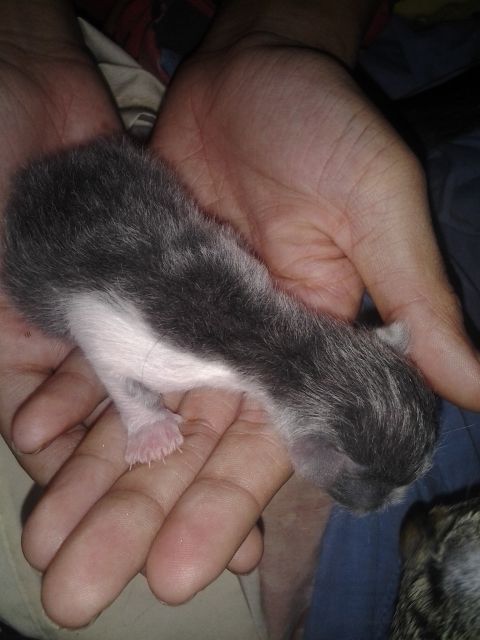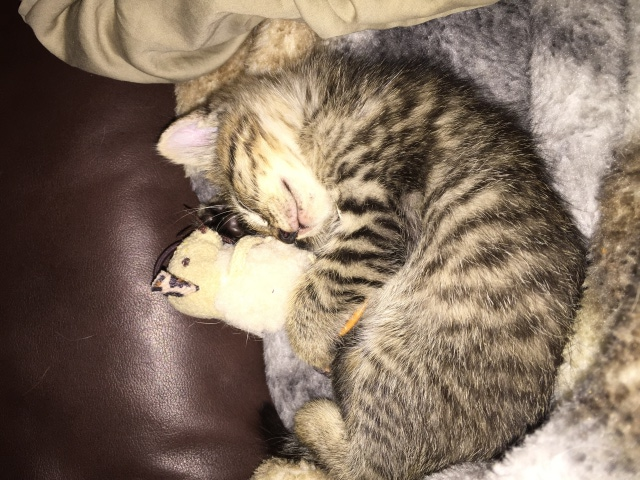QuestionHi There, I am a little worried about my 10 day old kittens. They are rescue kittens and I am currently bottle feeding them. i just recently found a single small cream colored worm in their bed. What should I do? I have a small dog. will this be a concern for the dog too?
Thanks,
Angie
AnswerHi Angie. Do any other animals share this bed? If the kittens are only ten days old, they shouldn't be old enough to be shedding any worms just yet. The major types of worms in cats - roundworms and tapeworms - take three weeks to reach maturity, when you will start seeing them shed through the anus or sometimes see roundworms be thrown up in vomit. It's extremely unlikely that this worm, if it's parasitic in nature, came from these kittens if their age is accurate. Could the kittens be older than 10 days?
It's rare for cats to pass worm to dogs. In general, species of worms that infect cats cannot infect dogs, though there is one roundworm and very rarely, a hookworm that both may become infected with. Tapeworms are not directly infective and are only passed through fleas. Your dog is not at high risk for contracting any worms from the kittens. If you're concerned, I recommend to ask your vet for some Revolution for the dog, which will protect him against all the parasitic worms that may be a worry.
Now to identify the kind of worm you discovered. If the worm resembled a grain of rice or a sesame seed, it was a tapeworm segment. This is actually the egg sac of a large worm that's anchored inside the intestines. The egg sacs are shed through the anus and are free moving until they dry out in the environment. They become brittle and break open, where flea larvae feed on the eggs. As the fleas mature, the tapeworm eggs undergo a change inside them. When the fleas hop onto your pets, they get swallowed as your pets groom themselves. This is how they become infected with tapeworms.
So, the key to dealing with tapeworms is to first get fleas under control. At this age, flea combing is the best way to do this. In a few weeks, the kittens should be big enough to treat with Capstar if necessary. Because young kittens can die of flea-induced anemia, if fleas appear to be a serious problem, consider bathing with Johnson's Baby Shampoo (but beware of causing a chill!) or consult a vet about applying a couple drops of Advantage.
Once fleas are under control, the kittens can be given a medication to kill the tapeworm, but not until they are six weeks old. There is an over-the-counter treatment called Tape Worm Tabs. Fortunately, tapeworms do not usually cause great health problems, so unless the kittens experience diarrhea, it's typically fine to wait until they are this age to treat tapeworms. If the kittens DO experience diarrhea or weight loss, ask a vet.
If the worm looked more like spaghetti, it was a roundworm. These are free moving in the intestines. Eggs shed in the feces and become infective once they are in the environment for 48 hours. Cats become infected by swallowing the eggs while grooming.
The kittens are too young to deworm at 10 days old, but if roundworms are suspected, they can be dewormed by a vet starting around the age of 3 weeks. Please don't use any over-the-counter cat dewormers in babies of this age. They're unsafe and have caused deaths. Vets have a very safe dewormer, pyrantel pamoate, that will safely kill roundworms. They even have combination medications that kill roundworms and tapeworms.
Hookworms are quite rare in cats, and because they anchor themselves to the intestines with hook-like teeth, we almost never see these tiny worms. The only signs of these worms are typically blood-tinged diarrhea, pale gums and weight loss.
Best of luck with your little ones!
Jessica

 pregnat cat ??
Questionsophia
QUESTION: no one is avaible for t
pregnat cat ??
Questionsophia
QUESTION: no one is avaible for t
 Trouble with my Two female cats.
Question
The kitten Two Cats
Hello, I have
Trouble with my Two female cats.
Question
The kitten Two Cats
Hello, I have
 Found 4-5 week old kitten
Question
Chloe
Hi. We found a 4-5 week old kitte
Found 4-5 week old kitten
Question
Chloe
Hi. We found a 4-5 week old kitte
 Identify Cat Breed?
Question
picture of my cat picture of my cat &nbs
Identify Cat Breed?
Question
picture of my cat picture of my cat &nbs
 Worried that my cat has a UTI??
Question
Oscar
Hello,
My name is Danielle and I have t
Worried that my cat has a UTI??
Question
Oscar
Hello,
My name is Danielle and I have t